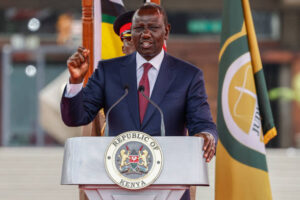
By Thomas Mauko,
The Finance Committee of the National Assembly retreated on Wednesday to produce a report on the Finance Bill, 2024, which will be tabled in Parliament next week.

The committee, chaired by Molo MP Kuria Kimani, concluded public hearings on Tuesday.
On Tuesday, the committee met with various government agencies to discuss a number of public-submitted recommendations.
This was done to gain their thoughts on the specific problems raised during the public engagements on the Bill and how they might affect the economy if passed.
During the two-week period, the committee held public hearings in a few selected counties around the country, culminating in a final one at KICC in Nairobi.
At the end of the session, Kimani was confident that the views from all stakeholders had been factored in ahead of the tabling of the report.
“We have come to the end of the public participation exercise on the Finance Bill and we are now set to retreat to develop our report,” he said.Among those who spoke during the session was Environment Principal Secretary Festus Ngeno, who expressed his thoughts on the imposition of the proposed Eco-levy, given its expected impact on the industrial sector.
Ngeno argued that the charge is one of a number of initiatives being implemented by countries in recognition of the enormity of the expansion of harmful waste streams in recent decades.
“Hon. Members, the revenue generated from the levy is earmarked for such initiatives as putting up enhanced waste management systems, creating public awareness and education through nationwide campaigns, to support innovation and enhanced research and development in green technologies,” he explained.
Committee Members David Mboni (Kitui Rural), Julius Rutto (Kesses), and Joseph Munyoro (Kigumo) expressed worries that without ring-fencing the budget, the planned initiatives would fail due to delays in grant disbursement.
The Committee also met with Transport Cabinet Secretary Kipchumba Murkomen to discuss the expected impact of the planned rise in the Fuel Levy fee from Sh18 to Sh25 per litre.
Though he made a strong case for increased revenue to help with the road maintenance backlog, as well as the potential effects of e-mobility and growth in the size and quality of the road network, members emphasised the importance of the ministry demonstrating that their budgetary allocation was being used effectively. Treasury Principal Secretary Chris Kiptoo also appeared before the Committee to explain the revenue-raising initiatives in the Bill.
He informed the Committee that the Finance Bill, 2024, is primarily focused at restructuring the tax system, increasing tax administration efficiency, and boosting compliance.
Noting that the country was on the path of fiscal consolidation, he emphasised the importance of raising enough money to sustain government programmes while remaining within the country’s means.
“Mr. Chairman, considering the need to mobilize sufficient revenue to stabilize our debt, I urge the Committee Members to favorably consider all the proposed provisions in the Finance Bill, 2024,” he urged.
He also stated that the MTRS would be implemented over a three-year period, from FY 2024/25 to FY 2026/27.
Earlier, the Committee received statements from the Ministry of Defence, represented by Principal Secretary Patrick Mariru and Vice Chief of Defence Forces Lt General John Omenda.
During the engagement, Mariru presented a compelling case for the exemption of excise duty on commodities sold to the Defence Forces Welfare Services.
He stated that the organisation is a non-profit that provides welfare services to the Kenya Defence Forces.




